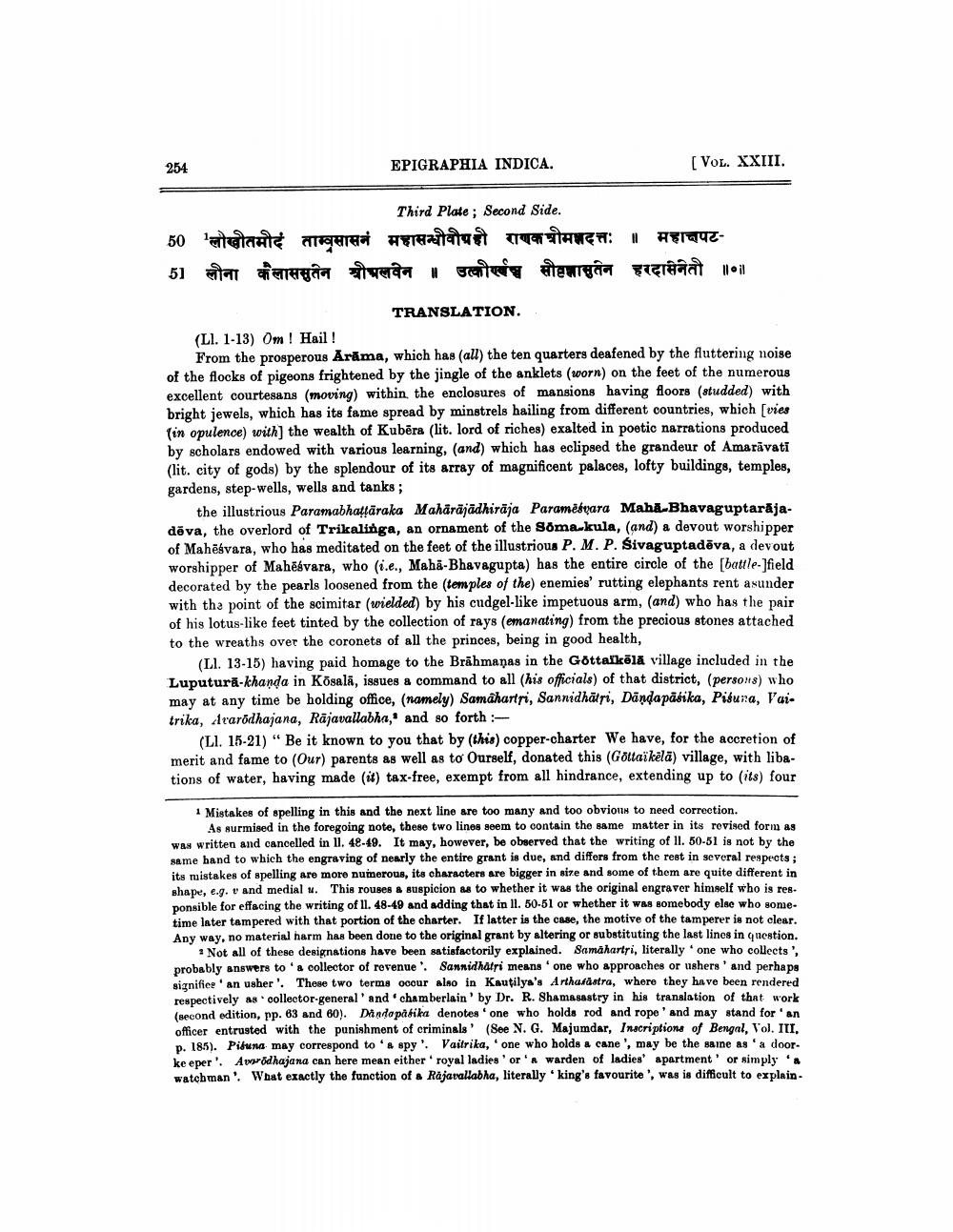________________
254
EPIGRAPHIA INDICA.
[VOL. XXIII.
Third Plate; Second Side.
50 'लोखोतमोदं ताम्बुसासनं
महासन्धीवोग्र हो राणक श्रोमशदत्तः ॥ महाचपट
5] लौना कैलाससुतेन श्रीअलवेन ॥ उत्कीर्णच सोवृज्ञासुतेन हरदासेनेती ॥॥
TRANSLATION.
(Ll. 1-13) Om! Hail!
From the prosperous Arama, which has (all) the ten quarters deafened by the fluttering noise of the flocks of pigeons frightened by the jingle of the anklets (worn) on the feet of the numerous excellent courtesans (moving) within the enclosures of mansions having floors (studded) with bright jewels, which has its fame spread by minstrels hailing from different countries, which [vies (in opulence) with] the wealth of Kubera (lit. lord of riches) exalted in poetic narrations produced by scholars endowed with various learning, (and) which has eclipsed the grandeur of Amaravati (lit. city of gods) by the splendour of its array of magnificent palaces, lofty buildings, temples, gardens, step-wells, wells and tanks;
the illustrious Paramabhaṭṭāraka Mahārājādhirāja Paramesvara Maha-Bhavaguptarājadeva, the overlord of Trikalinga, an ornament of the Soma-kula, (and) a devout worshipper of Mahesvara, who has meditated on the feet of the illustrious P. M. P. Šivaguptadēva, a devout worshipper of Mahesvara, who (i.e., Maha-Bhavagupta) has the entire circle of the [battle-field decorated by the pearls loosened from the (temples of the) enemies' rutting elephants rent asunder with the point of the scimitar (wielded) by his cudgel-like impetuous arm, (and) who has the pair of his lotus-like feet tinted by the collection of rays (emanating) from the precious stones attached to the wreaths over the coronets of all the princes, being in good health,
(Ll. 13-15) having paid homage to the Brahmanas in the Göttalkēlā village included in the Luputura-khanda in Kōsala, issues a command to all (his officials) of that district, (persons) who may at any time be holding office, (namely) Samahartri, Sannidhātri, Dandapäsika, Pisura, Vaitrika, Avarodhajana, Rajavallabha, and so forth :
(Ll. 15-21) Be it known to you that by (this) copper-charter We have, for the accretion of merit and fame to (Our) parents as well as to Ourself, donated this (Göttaïkelä) village, with libations of water, having made (it) tax-free, exempt from all hindrance, extending up to (its) four
1 Mistakes of spelling in this and the next line are too many and too obvious to need correction.
As surmised in the foregoing note, these two lines seem to contain the same matter in its revised form as was written and cancelled in 11. 48-49. It may, however, be observed that the writing of 11. 50-51 is not by the same hand to which the engraving of nearly the entire grant is due, and differs from the rest in several respects; its mistakes of spelling are more numerous, its characters are bigger in size and some of them are quite different in shape, e.g. v and medial u. This rouses a suspicion as to whether it was the original engraver himself who is res ponsible for effacing the writing of ll. 48-49 and adding that in 11. 50-51 or whether it was somebody else who sometime later tampered with that portion of the charter. If latter is the case, the motive of the tamperer is not clear. Any way, no material harm has been done to the original grant by altering or substituting the last lines in question. Not all of these designations have been satisfactorily explained. Samähartri, literally one who collects', probably answers to a collector of revenue'. Sannidhätri means 'one who approaches or ushers' and perhaps significe an usher'. These two terms occur also in Kautilya's Arthafastra, where they have been rendered respectively as collector-general' and chamberlain' by Dr. R. Shamasastry in his translation of that work (second edition, pp. 63 and 60). Dandapäbika denotes one who holds rod and rope' and may stand for ' an officer entrusted with the punishment of criminals' (See N. G. Majumdar, Inscriptions of Bengal, Vol. III, p. 185). Pibuna may correspond to a spy'. Vaitrika, one who holds a cane', may be the same as a doorkeeper'. Avarödhajana can here mean either royal ladies' or a warden of ladies' apartment or simply a watchman. What exactly the function of a Rajavallabha, literally king's favourite', was is difficult to explain
"




